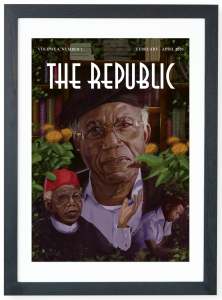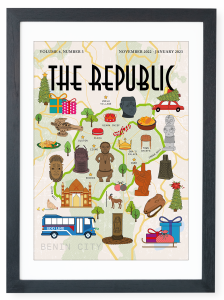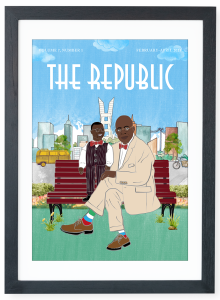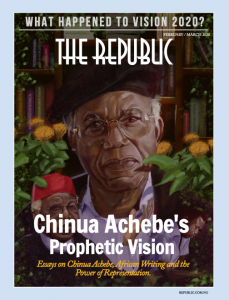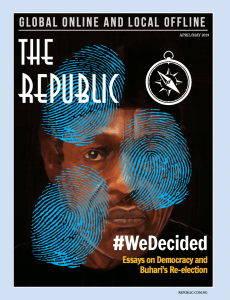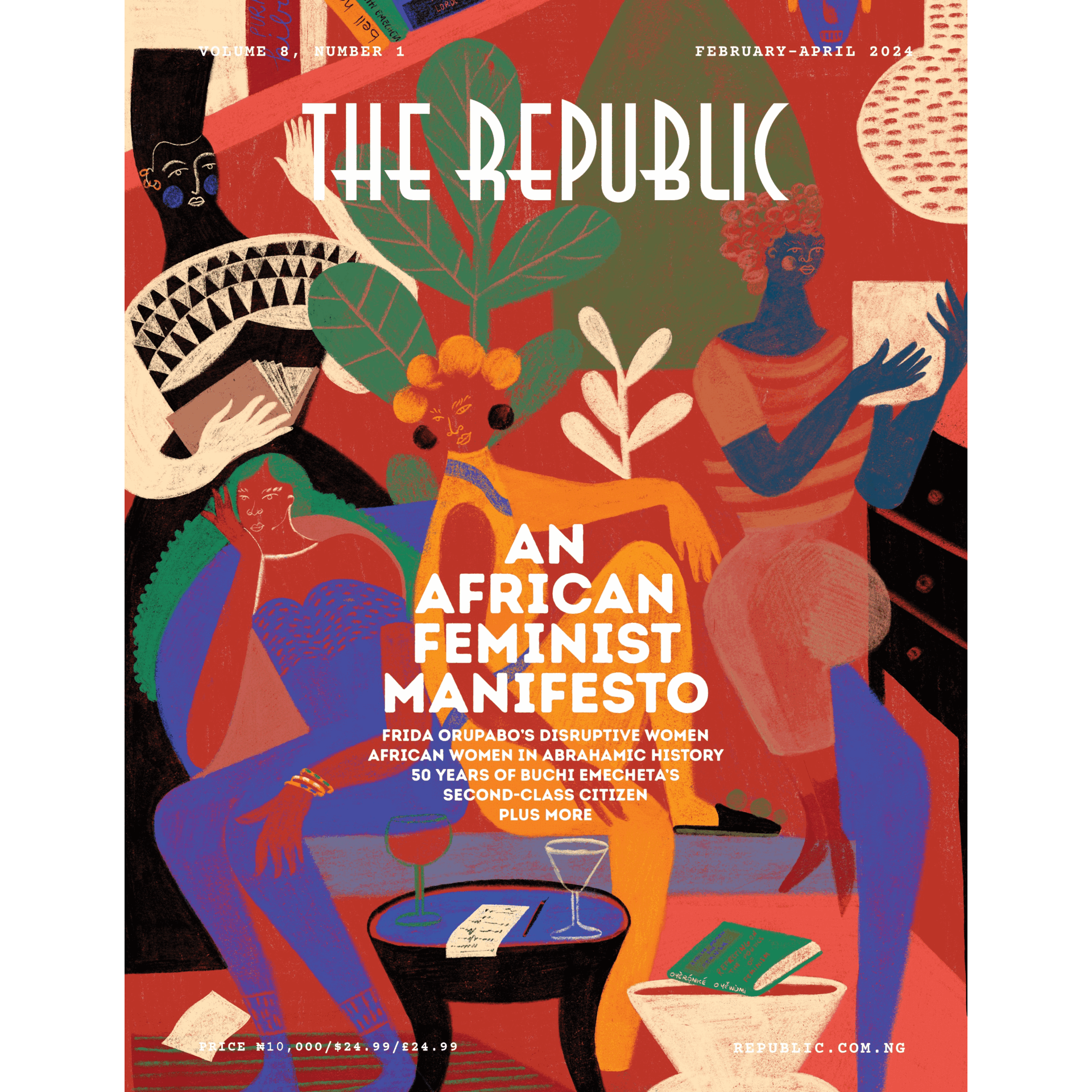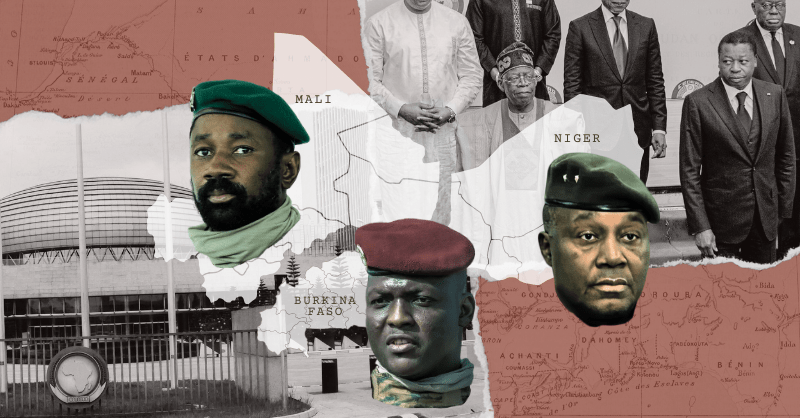
Assimi Goïta, Ibrahim Traoré and Abdourahamane Tchiani. Photo Illustration by Dami Mojid.
THE MINISTRY OF POLITICAL AFFAIRS
Geopolitical Projections in West Africa and the Wider Continent
One of the major geopolitical developments in Africa through 2023 was the signing of a charter by Mali, Burkina Faso, and Niger to establish a framework for collective defence and mutual assistance. The signing of the ‘Liptako-Gourma Charter’ brought forth l’Alliance des États du Sahel (AES) and this move signalled not just the loss of credibility for the French-led G5 Sahel group, but a new example of a multilateral organization in Africa. On one hand, the alliance consists of military-led governments moving towards a new phase of political independence and on the other hand, there is the scramble by mainstream media to control the narrative around the development i.e., the fallback of democratic governments in exchange for juntas.
The formation of the AES is triggering a new consciousness for the average citizen in French-speaking African countries, and this is causing external powers and interests to review their positions in the Sahel region. France’s Operation Barkhane (a French-led counterterrorism campaign launched in 2014 targeting extremist insurgents throughout the Sahel region of West Africa) is considered a failure by critical analysts and reporters, no different from the US’s just concluded Operation Enduring Freedom in Afghanistan. Both operations are considered parts of the wider war on terrorism and both France and the US ended operations without achieving stated objectives. In the case of France, it is argued that since the start of Operation Barkhane in August 2014, the security condition in the Sahel has worsened. This is especially true considering that civilians had been attacked in error by French forces in 2021, and also considering the tacit support French forces gave to the Movement for the National Liberation of Azawad—an AlQaeda-affiliated separatist group that occupied the Kidal region of Northern Mali from 2013 until 2023 when the Goita-led junta recaptured the region. The point here is that a handful of West African countries made a pioneering move to cooperate on security matters outside the purview of Euro-Atlantic influence.
shop the republic
WHAT’S BEEN HAPPENING IN THE SAHEL?
Observing the internal conditions of the member states of the AES, it is clear that solutions to development challenges are at the forefront of relations and governance plans. The AES is also enjoying much popular support from citizens and government officials, with reports showing that the prime ministers of Mali, Niger, and Burkina Faso affirm commitment to the alliance. The three prime ministers also attended a rally in Niamey, Niger in December 2023 that saw thousands celebrating the full withdrawal of French troops from Niger. Prime Minister Chougel Maiga of Mali was quoted by Reuters as saying ‘And so AES was born. If you notice, it all started with safety issues. Today, collaboration between our three armies has reached an extremely high level of integration. And that scares some people.’ Burkina Faso’s Appollinaire Joachim Kyelem de Tambela said, ‘From now on, we say, whether you’re from Mali, Niger or Burkina, we have the same destiny. We’re going in together.’ These countries, since their respective coups occurred, have exposed a sort of rift in international relations especially around the narrative of democracy being the ‘correct’ and ‘just’ way a state be governed.
In a further expression of geopolitical autonomy, Burkina Faso strengthened ties with Venezuela, Nicaragua, and Cuba. This is significant because the South American countries in this context are rivals of the United States especially as they were targeted by Washington during Washington’s war against communism around the time of the Cold War in 1958, 1982, and 1961 respectively. Niger, on the other hand, moved to nationalize its water sector, ending a 22-year-old contract with French Veolia Group, which provided access to drinking water for most of Niger’s population. Mali focused on bolstering economic, diplomatic and military ties with Russia, following the breakdown of relations with France. These are developments that further signal the intent of the alliance to build resilience individually and as a collective. At the same time, it is critical to note that the geopolitical interests of the US and France in the region are being threatened. There is also the perspective of the West’s bluff being called out, in the sense that the benefits of economic cooperation with the West do not outweigh the gains of direct African multilateral cooperation. Considering the value of natural resources at stake, it is refreshing to witness a new era and style of partnership between African countries, especially without the input of foreign powers and interests.
shop the republic
WHAT DO ‘THEY’ WANT?
Amidst the potential for new levels of intra-African relations, the interests of foreign powers must be observed, along with the type of influence wielded in service of foreign interests. France, for instance, maintained very strong links with West African countries under its colonial influence in the form of the informal Françafrique policy. France also has the so-called right to ‘first refusal’ of buying natural resources found in former French colonies. Niger, for instance, is a critical factor in the energy sector of France and is among the top three suppliers of uranium to France, behind Kazakhstan and ahead of Uzbekistan. Of the 88,200 tons of natural uranium imported in France since 2012, 20 per cent of that uranium has come from Niger. Moreover, the current breakdown in relations between the two countries is considered a threat with possible consequences for France’s energy independence.
The US on the other hand is known to house several military assets in the region including the Agadez drone base, its largest in Africa, from which offensive military activity has been launched around the continent. The US Central Intelligence Agency is also known to operate a drone base out of Dirkou in Niger, and these assets are key to the US’s military footprint in the region vis-à-vis AFRICOM, which is the platform through which the US pushes its military and security objectives in Africa. These are determining factors that dictate reactions to developments such as the various coups in West Africa. Amidst the many transformations occurring in Africa, a key aspect is the role of popular support. From processions in Burkina Faso and Mali to Nigerien officials affirming commitment to the AES, civil societies in neighbouring countries are certainly looking at the developments as examples of how to handle dissatisfaction with governance, insecurity and economic underperformance.
shop the republic
WHERE NEXT?
As mentioned earlier, a new element in geopolitics in Africa is the new growth of political consciousness and popular willingness to organize against unfavourable status quo. Burkina Faso has seen an upsurge in political participation among the youths and there is renewed effort by pan-African organizations to collaborate towards progressive politics. For instance, the All-African Revolutionary Party reiterated its support for the African Party for the Independence of Guinea and Cape Verde; the Pan-Africanist Congress of Azania held the annual national conference in August 2023 in Durban; while the Black Alliance for Peace sent a peace delegation to China amidst the tensions between the Beijing and Washington vis-à-vis great power competition.
Amidst the many geopolitical shifts taking place in Africa, there is also the resurgence of nationalism inspired by anticolonialism on the continent particularly among the poor and working people. Unfortunately, there are roadblocks on this path; on one hand, the tragedy of the Economic Community of West African States mulling over a possible military intervention in Niger under what many analysts argue is in the interests of the Euro-Atlantic bloc; on the other hand, a politically unifying event such as the Convention 2024 was abruptly cancelled by the Ghanaian government in what student groups saw as a betrayal in the journey of boosting progressive political consciousness among African youth. Formally titled ‘The Convention 2024’, the events attendees were set to include Dr Arikana Chihombori Quao from Zimbabwe, Patrick Loch Otieno Lumumba from Kenya, Julius Sello Malema from South Africa and Peter Obi from Nigeria, all very influential individuals that are in the political consciousness of young Africans who have made the choice to be more intentional and progressive about the type and quality of governance in their countries. Africa is central to world geopolitics, and the recent developments around the continent are only representative of a new phase of relations between nations, governments and myriad interest groups⎈






